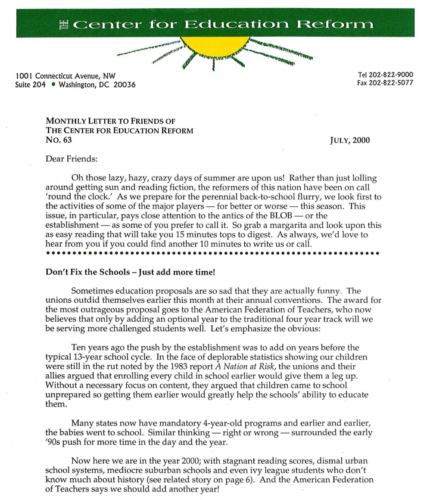Sixteen years ago, CER was paying close attention to the antics of the BLOB. Sadly, and at the expense of our kids, what’s old is new, as not much has changed…
An excerpt from CER’s July 2000 Monthly Letter to Friends:
A funny thing happened on the way to the forums… Union forums, that is. When both NEA and AFT convened to hash out their agendas and policies for the next year, there was more media skepticism than ever before about their role in improving America’s schools. The conventions were seen as self-serving, egocentric and overly political. The NEA voted to raise dues payments by five dollars. It will use these funds to stock its war chest to fight choice and charter efforts. The AFT resolved to “take back” the charter issue and reissued its set of conditions under which they will support charters, a box into which most of the nation’s 2000 charter schools would not fit.
Interestingly, both unions took up the issue of performance-based pay and NEA chose to have a formal dialogue. According to the report in the Teacher Quality Bulletin:
“The NEA passed a resolution affirming its opposition to performance-based pay at its convention. The resolution has sparked debate around the country, including criticism in several major newspapers. A Washington Post editorial described unions as ‘too often simply defending the status quo, even when that status quo means inferior education for too many children.’ A Chicago Tribune editorial began ‘Few professions reward workers merely for showing up. Many public schools do, though.’ In an op-ed, Chester E. Finn, Jr., president of the Thomas B. Fordham Foundation, chided the union for claiming to stand for reform while in reality focussing only on the short-term interests of its members. Andrew Rotherham, of the Progressive Policy Institute, criticized the union for its reflexive opposition to new ideas.”
A catfight is in play among NEA rank and file over high stakes testing. Some of the same anti-testing fervor we profiled last month dominates the ranks of NEA delegates, who wanted the NEA this year to go on record opposing high stakes testing. One particular delegate writes on an anti-testing list-serve:
“I introduced new business item 63 at the representative assembly…which urged NEA to assist state affiliates in lobbying for a ban on high-stakes tests. [It was] referred to committee. What committee will this go to and what will happen to this new business item? What would have happened had it been approved? Resolution B55 details our philosophy about standardized tests as does line 47 under Legislative Concerns: NEA opposes reliance on a single test for determining a student’s future or as an indicator of school success. Bob Chase addressed this issue in his article ‘Tests and Sensibility ‘ in NEA Today last January. How have these words in Resolutions, Legislation, and from the President’s Corner been acted upon? NEA touts a commitment to advancing the cause of public education but has pandered to legislators and to corporate America on the issue of high-stakes testing. We have got to have the courage and the principles to publicly oppose these tests no matter the consequences. We are the largest and most powerful union in the nation. We must use this to our advantage to speak out for our students who have become pawns in a political game for over which they have no control. We, the true experts, cannot be a party to this testing travesty any longer.”
How, we wonder, does this union delegate explain the progress of 83 schools in the District of Columbia, who for the first time in recent memory increased test scores upon the heels of standards and testing hitting the District? More than a few DC school principals have cited the focus on tests as largely responsible.
Hands in the Cookie Jar. The IRS and Federal Election Commission (FEC) are investigating whether or not the NEA has violated the rules barring significant use of tax exempt funds for political purposes. After scrutinizing NEA documents Landmark Legal Foundation found that the same union that boasts an ability to oppose legislation and elect NEA-friendly legislators does not report any political expenditures on its federal tax return as required by the IRS. While NEA’s political arm is permitted political expenditures, NEA maintains that its general kitty of money is not used at all for political purposes. According to Landmark, this is despite the fact that the last several annual NEA budgets include line item expenditures for political action and the recruiting and election of candidates for school boards and other offices. “The issue is whether the NEA leadership in Washington is complying with federal tax laws and whether it is fully informing America’s teachers and the public about the enormous reach of its political activities,” said Landmark’s Mark Levin.


